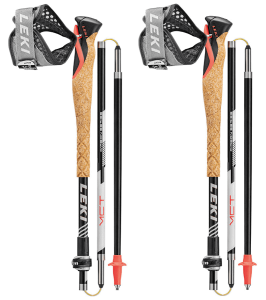Leki MCT 12 Vario Carbon Poles Review
Poles have become quite a subject in the world of ultrarunning over the last few years. Runners from across the spectrum, are now carrying poles for use over long-distance events, from the ‘walkers’ through to the elite.
“Evolving from the world of hill walking and into trail running, fastpacking and ultra, there are a wealth of various models that you can lay your sweaty hands on, if you decide poles are for you. Prices range from around £40 up to £200, and the better poles being made from either aluminium or carbon fibre. I’ve used mid-range carbon fibre in the mountains for shorter (20 – 30 mile) training runs, a stern 100-mile mountain event, through to now thoroughly testing the new Leki MCT Vario Carbon poles. Hopefully this review with not only justify the higher price, but also to give you good piece of mind in most areas should you decide to try a pair yourself.”

“One thing that you can’t expect from a pole, is for them to run the mountains for you. You need to practice your technique and become efficient with them. With this – you might not reap the benefits of an expensive pole straight away.”
Most people that I have spoken with start off with a less expensive pair, and then upgrade once they decide that poles do work for them, and once they have developed a good technique. You can buy the MCT Vario now for anything from £135 – £195, and despite that seeming very steep, they will last you far longer than a pair of £150 trail shoes. If you are at a level where weight and ease of use are important – maybe see it as an investment.
It was interesting for me to find the differences between my last pair (which were a carbon fibre design, non-adjustable length, three-piece pole in the £80 range), and the Leki MCT Vario. What are the benefits of a more expensive set (if any) and were the main factors of the design worth an additional £100 (at the top end). In a nutshell – there were major benefits for the price, which I’ll fill you in on…
“Firstly, and importantly; this set can adjust from 110cm up to 130cm, and weighs in at 200grams per pole, with a pack size of 42cm. That’s pretty impressive, and on a mission you will notice the grams over time (especially on a multi-day event such as the TDG). The length adjustment and locking system is very swift and easy to master (Leki’s Speed Lock 2 technology and Core Locking Device).”
I’ve had two pairs of running poles over a period and both have been too long, despite how carefully I’ve followed sizing advice. You need to remember that as the terrain changes, so should the length of pole. My personal choice (me being 5.11) is 110cm for uphill, and 120 for downhill (if I use them for downhill). To have the ability to vary the length is a huge bonus and one worth paying for.
“The other nifty bit of design is the Trigger Shark 2.0 System. This is where the additional money goes, so I was very keen to find out if this was just a gimmick, or indeed – a game changer. The poles I got for review came with the Shark Frame Strap Mesh, which unlike the traditional attached pole straps, clip and unclip to the pole as and when needed. They fit onto your hand more like a mesh glove than a strap. This is not fiddley at all, as after a short practice, you can attach and detach with one hand (well, just your thumb actually!) on the fly.”
The mesh straps do not make your hands toO warm (being glove-like), and on a cold day – they fit over gloves, so you have the best of both worlds. They don’t chaff or irritate either, which was a concern for me. I recently ran a 35 miler in the mountains with over 11500ft of gain, in very mixed conditions (cold then hot, hot then cold etc) and the dual benefits in all respects, were appreciated.
You can buy two other sets of gloves that are compatible with the Trigger Shark system (including the cool looking Nordic Move Shark), which is also an added benefit, although maybe due to the fact you can get the Shark Mesh over your existing glove, maybe more of a ‘nice to have’ than a necessity.
“In summary, my verdict is that they are very much worth the money. As I mentioned from the outset – I’m not an avid user of poles, although despite this, the Leki MCT Vario set is a cracking piece of kit. If poles are your thing and you are progressing into longer miles, or multiple day events, these will make life a lot easier. I’ve really enjoyed using them, and the ease of use and adjustability has very much made me think differently about poles in the future.”
Find out more about the Leki MCT Vario here.
Tested and Reviewed by Chris Davies for Ultrarunner Magazine